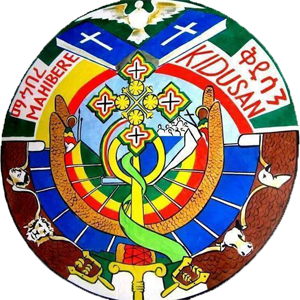About Mahibere Kidusan
Name
The association was named Mahibre Kidusan (an association in the name of Saints) Saints would be commemorated in that they abounded the secular world and sacrificed their lives to the orthodox belief for whom the prophets prophesized and apostles evangelized.
History
In 1977 E.C (Ethiopian Calendar) few students of higher education initiated the youth in the compass to become members of Sunday school and know the teachings of the churches. Later, this effort had been strengthened by students trained in the Zeaway Hamere Berehan St.Gebreil Clergy Training Monastery by the Then Arch Bishop of Shewa Abune Gorgorious II.
The movements continued in Bilatie military camp that brought all students of higher institutions in the country in 1983 E.C after a year, with the blessing of the church fathers the associations was set up by the name “Mahibre Kidusan” under the Sunday School Department of the Ethiopian Orthodox Tewahedo Church. Since then the associations has been proving spiritual service.
Vision
“Envisioning the Church fulfill its universal leadership role.”
Mission
Fructify and procure an organized, whole, eloquent, moderate, versatile and leader generation who strives in achieving the church’s mission and diligently work for her existence.
Institutional Asset
OBJECTIVES
Stand
The association shall not interfere in administrative affairs of the church and it is free from and political affiliation.
Membership
- Disciples who trained in various training institution of the church and providing ministerial activity.
- Higher institution students attending Sunday in their respective parishes.
- Member of Sunday school or/and parish that provide spiritual service after graduating from higher institution.
- The laity who support the objective of the association with their knowledge, money and labor.
Structure
Mahiber Kidusan is set under the Sunday School department of the Ethiopian Orthodox Church. It provides spiritual services by its sub centers in the dioceses all over the country and in the Diaspora.


Covenant of Mercy
Beloved Children of God, Greetings to you and gratitude to Almighty God!
Dear Children, how are you? We hope you are well and good!
Today we are going to teach about the Covenant of Mercy who is our Holy Mother Saint Mary.
Ge’ez
Ge‘ez, is a South Semitic language that survived as a spoken language in what is now Ethiopia and Eritrea until sometime between 900 and 1200 and remains in use as a liturgical language to this day. In its earliest form, the Ge’ez script was an abjad, or writing system consisting only of consonants; by the 4th century the script had developed into an abugida, or alphasyllabary, a writing system in which each symbol represents a consonant-vowel combination. Ge‘ez literature is dominated by religious texts, and this is reflected in the collection of manuscripts at the Fisher, which includes prayer books, a Psalter, a hagiography of Abuna Gabra Manfas Qeddus, and a life of Jesus Christ.
God knows all things
Many may be tempted in thinking God might not answer their prayer and be tempted to lose heart and faith in the promises of the Lord. There seems to be this idea among many Christians that as long as we ask for good and Godly things, then surely God will give them to us. Observing as how God is omnipotent and His loves for humans, then surely He will not deprive us from those good things that we are asking for. Yet, even the One Holy Church is filled with history and examples to prove the complete opposite of this.
Nineveh’s Fast
Nineveh’s Fast is the commemoration of the penance of the Ninevites through the preaching of Jonah. It lasts for three whole days, representing the time spent by Jonah inside the belly of the whale, starting on a Monday to Wednesday exactly two weeks before the fast of the Great Lent. The eating of fish and all forms of animal fat are abstained from by the Church during this fast. (Jonah 3:1-10)
“As one whom his mother comforts, so I will comfort you” (Isaiah 66:13)
Only God is the true remedy and comfort to the great sorrow of human beings. We all believe in God seeking His mercy during hardships we endure in everyday life, descending into hopelessness, whilst life makes no sense; frequently, left high and dry, without a shoulder to cry on, in tortured life while soul is eternally condemned.